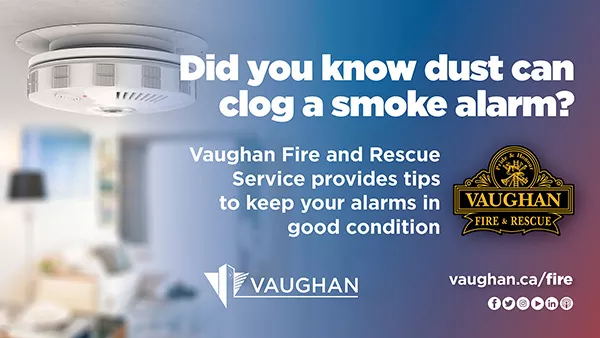Did you know dust can clog a smoke alarm?
Vaughan Fire and Rescue Service provides tips to keep your alarms in good condition
Did you know that you should check your smoke and carbon monoxide (CO) alarms once a month? Vaughan Fire and Rescue Service (VFRS) is reminding residents to test their alarms and that proper maintenance will ensure they are in good working order in the event of an emergency.
Dust can clog a smoke alarm, so gently vacuum alarms every six months using a soft brush. Never vacuum electrically connected alarms unless you shut off the power. Test your unit when you are finished cleaning. When installing, testing and maintaining smoke alarms, make sure you follow the manufacturer’s instructions.
Follow these other essential tips from VFRS:
- Replace your CO alarms every five to 10 years and your smoke alarms every 10 years – they do expire and will have a date clearly marked on them.
- Use interconnected smoke alarms – when one alarm sounds, they all sound throughout your home.
- Test all alarms at least once a month. Press the test button to be sure the alarm is working.
- Use special alarms for those who have hearing loss or are deaf – these alarms have strobe lights and bed shakers.
Remember, your CO alarm sounds differently than your smoke alarm. Test both alarms regularly and make sure everyone in your home knows the difference between the two alarm sounds. It’s also important to know the difference between the low-battery warning, end-of-life warning and emergency alarm sounds – consult your smoke and CO alarm manufacturer instructions.
Winter fire safety
As the temperature outside drops, you may be turning on the furnace, fireplace or a portable heater in your home to keep warm. It’s important to be mindful that heating equipment is a leading cause of home fires in Ontario.
To help ensure you and your family stay safe this winter, VFRS is providing the following important fire safety tips:
- Ensure your furnace is in good working order by having it inspected every year by a qualified professional. Follow the manufacturer’s recommendations for replacing the filter. If you ever see any rust spots on or around the unit or hear any unusual noises, have an expert take a look.
- Keep all combustibles – especially clothing, paper or wood products – at least three feet (one metre) away from a furnace, fireplace, wood stove or portable heater. These items are easily ignited and should be kept well away from heating sources.
- Never burn paper, boxes, cartons or other types of packaging material in the fireplace. They burn rapidly and generate a lot of heat.
- Never use an oven, barbecue or candles to heat your home, and only operate an electric heater inside your home. Fuel-burning space heaters are for outdoor use – if used inside, they will release products of combustion including carbon monoxide (CO). If you ever smell gas in your home, leave immediately and call 9-1-1.
- Don’t make electric space heaters the primary source of heat for your whole home. These devices come with fire risks. To stay safe, plug the heater directly into the wall rather than into an extension cord, and remember to turn off and unplug space heaters when you leave the room or go to bed. Put portable heaters on a hard, level surface that is non-flammable, such as concrete or ceramic flooring, and far away from water.
- Do not place heaters in doorways or the middle of the room as they could become a tripping hazard.
- Use a space heater that will automatically shut off if it falls over or if the temperature gets too hot. It’s also essential to look for a safety certification from an organization like the Canadian Standards Association.
- Make sure you have working smoke and CO alarms on every floor of your home and outside all sleeping areas. Test the alarms at least once a month and replace any that have expired.
In the event of a fire, make sure everyone knows how to get out safely. It’s crucial to develop and practise a home fire escape plan with all members of your household and make sure someone helps young children, older adults or anyone else that may need assistance to evacuate. Once outside, stay there and call 9-1-1.
For more information and fire safety tips, visit vaughan.ca/fire or watch the City’s video on the importance of checking your alarms.
For updates and news as they happen, subscribe to Vaughan News and follow the official corporate channels on Twitter, Facebook, Instagram and LinkedIn.
-30-

